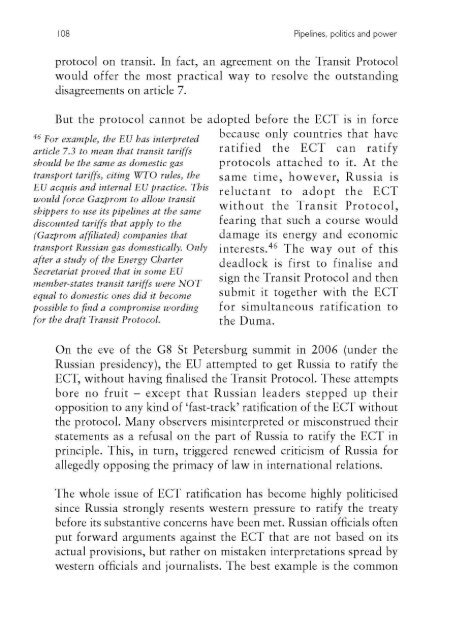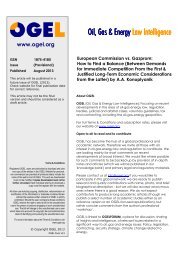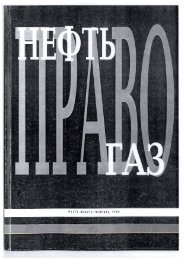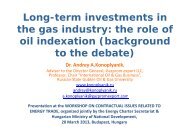Pipelines, politics and power: The future of EU-Russia energy
Pipelines, politics and power: The future of EU-Russia energy
Pipelines, politics and power: The future of EU-Russia energy
You also want an ePaper? Increase the reach of your titles
YUMPU automatically turns print PDFs into web optimized ePapers that Google loves.
08 <strong>Pipelines</strong>, <strong>politics</strong> <strong>and</strong> <strong>power</strong><br />
protocol on transit. In fact, an agreement on the Transit Protocol<br />
would <strong>of</strong>fer the most practical way to resolve the outst<strong>and</strong>ing<br />
disagreements on article 7.<br />
But the protocol cannot be adopted before the ECT is in force<br />
because only countries that have<br />
ratified the ECT can ratify<br />
protocols attached to it. At the<br />
same time, however, <strong>Russia</strong> is<br />
reluctant to adopt the ECT<br />
without the Transit Protocol,<br />
fearing that such a course would<br />
damage its <strong>energy</strong> <strong>and</strong> economic<br />
46 For example, the <strong>EU</strong> has interpreted<br />
article 7.3 to mean that transit tariffs<br />
should be the same as domestic gas<br />
transport tariffs, citing WTO rules, the<br />
<strong>EU</strong> acquis <strong>and</strong> internal <strong>EU</strong> practice. This<br />
would force Gazprom to allow transit<br />
shippers to use its pipelines at the same<br />
discounted tariffs that apply to the<br />
(Gazprom affiliated) companies that<br />
transport <strong>Russia</strong>n gas domestically. Only<br />
after a study <strong>of</strong> the Energy Charter<br />
Secretariat proved that in some <strong>EU</strong><br />
member-states transit tariffs were NOT<br />
equal to domestic ones did it become<br />
possible to find a compromise wording<br />
for the draft Transit Protocol.<br />
interests. 46 <strong>The</strong> way out <strong>of</strong> this<br />
deadlock is first to finalise <strong>and</strong><br />
sign the Transit Protocol <strong>and</strong> then<br />
submit it together with the ECT<br />
for simultaneous ratification to<br />
the Duma.<br />
On the eve <strong>of</strong> the G8 St Petersburg summit in 2006 (under the<br />
<strong>Russia</strong>n presidency), the <strong>EU</strong> attempted to get <strong>Russia</strong> to ratify the<br />
ECT, without having finalised the Transit Protocol. <strong>The</strong>se attempts<br />
bore no fruit – except that <strong>Russia</strong>n leaders stepped up their<br />
opposition to any kind <strong>of</strong> ‘fast-track’ ratification <strong>of</strong> the ECT without<br />
the protocol. Many observers misinterpreted or misconstrued their<br />
statements as a refusal on the part <strong>of</strong> <strong>Russia</strong> to ratify the ECT in<br />
principle. This, in turn, triggered renewed criticism <strong>of</strong> <strong>Russia</strong> for<br />
allegedly opposing the primacy <strong>of</strong> law in international relations.<br />
<strong>The</strong> whole issue <strong>of</strong> ECT ratification has become highly politicised<br />
since <strong>Russia</strong> strongly resents western pressure to ratify the treaty<br />
before its substantive concerns have been met. <strong>Russia</strong>n <strong>of</strong>ficials <strong>of</strong>ten<br />
put forward arguments against the ECT that are not based on its<br />
actual provisions, but rather on mistaken interpretations spread by<br />
western <strong>of</strong>ficials <strong>and</strong> journalists. <strong>The</strong> best example is the common<br />
Regulating <strong>energy</strong> relations: Acquis or Energy Charter 09<br />
claim that the ECT would force Gazprom to allow non-<strong>Russia</strong>n<br />
companies access to its pipeline system (at domestic tariffs). This is<br />
not the case. 47 Since such disagreements are<br />
not based on the treaty, they cannot be<br />
resolved at a technical level. <strong>The</strong>y will only<br />
go away if the other ECT members stop<br />
trying to ‘force’ <strong>Russia</strong> to ratify the treaty<br />
<strong>and</strong> instead discuss <strong>Russia</strong>’s substantive<br />
47 <strong>The</strong> ECT (IV.1.(b)(i)) states<br />
that “<strong>The</strong> provisions <strong>of</strong> the<br />
treaty do not oblige any<br />
contracting party to introduce<br />
m<strong>and</strong>atory third party<br />
access…” .<br />
concerns within the Energy Charter framework without opening a<br />
P<strong>and</strong>ora’s box <strong>of</strong> renegotiation.<br />
<strong>The</strong> Energy Charter process can help address substantive issues in<br />
various ways: first, as a forum for discussing practical issues, such as<br />
risks in the international <strong>energy</strong> markets, with a view to finding<br />
solutions based on international law; second, by working out nonbinding<br />
agreements, best practice <strong>and</strong> guidelines in contentious<br />
areas; <strong>and</strong> third, by adding new legally binding rules, for example<br />
through treaty amendments <strong>and</strong> protocols. <strong>The</strong> Energy Charter<br />
framework gives its members all these options – although the<br />
process <strong>of</strong> reaching agreement becomes more complex for the more<br />
binding instruments.<br />
Gas exporters do not want the acquis<br />
Both the <strong>EU</strong> <strong>and</strong> <strong>Russia</strong> know that they need a mutually agreed,<br />
common legal framework for their economic <strong>and</strong> <strong>energy</strong> relations.<br />
<strong>The</strong>y are contemplating three different routes to constructing such a<br />
framework. Only one <strong>of</strong> them is promising.<br />
<strong>The</strong> <strong>EU</strong> <strong>of</strong>ten talks <strong>of</strong> its desire to ‘harmonise’ its legal system with<br />
that <strong>of</strong> third countries, in particular neighbouring ones. But what it<br />
really means by that is the ‘export’ <strong>of</strong> <strong>EU</strong> internal legislation (acquis<br />
communautaire) to third countries. Such an approach might be<br />
realistic for some transit states, <strong>and</strong> perhaps certain <strong>energy</strong> producers<br />
that regard the <strong>EU</strong> as a model for economic development. However,<br />
the big gas exporters will want to remain outside the <strong>EU</strong>’s legal reach












